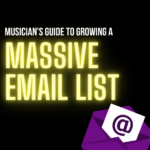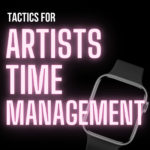This is a guest post from our friends at Bandzoogle who are experts in Musician’s Websites. We’ve been working with them as long as we can remember and are so excited to present this fabulous article on Musician’s Website Dos & Don’ts.
The band is getting along. Songs are great. Gigs calendar is filling up. Now you just need to get people to notice you and you’ll be good to go. But where do you start? You start with your very own musician’s website!
If you focus your efforts on Instagram, Facebook or Twitter, your music is likely to get lost in a sea of political rants and fur baby videos. The best way to keep fans focused on you is through your own custom musician’s website.
A musician’s website puts the focus on you and your music. It’s easy to build a musician’s website, but how do you know if you did it right? Let’s take a look and the most common ways bands win and lose with their website.
Dos
1. Do have a website
We often get the question, “Isn’t social media enough?” and the short answer is NO. Although social media is great for promoting your music, it can’t replace having your own musician’s website.
Social media is distracting. Your website is your personal piece of the internet that focuses on you.
2. Do have a great Homepage
The most visited page on any website is the Homepage. Make sure to build it properly to encourage visitors to click around to other pages. Include a couple of your best songs, some upcoming shows, and latest news. To get it just right, you can follow our blog post on How to build the perfect homepage for your band website.
3. Do use professional photos
Your header photo is so important that it’s almost better not to have a website than to have one that displays crummy photos. It might be tempting to use a candid shot or one from your phone, but resist. Those photos typically aren’t optimized and will display blurry on desktop computers.
Bad photos can create a negative impression on you and your music. We recommend investing the money for professional photos. Not only can you use them for your band web design, but also for social media and your electronic press kit.
4. Do use a call-to-action
A call-to-action (CTA) is the primary thing you’d like visitors to do once they hit your site. Some examples are:
- Buy my album!
- Watch our new video!
- Sign up to the mailing list!
This keeps visitors engaged with your content. It’s also important to ask for what you want. Add your CTA high on the page so it stands out.
5. Do have a mailing list signup
Speaking of CTA’s, the most important one is the mailing list signup form. Sure, getting someone to buy your track is ideal, but if they aren’t on your list it’s only a one time sale. When you get fans on your list you can notify them of new music, merch and tours. This creates a steady connection for fans to buy from you long term.
6. Do tell your story
The music will draw people to your site, but once they get there, they want to know about you. Have a dedicated bio page that talks about how you got started, what you’ve done, and where you’d like to go next. Having it written in third person makes it easy for media professionals to use parts of it in interview introductions and articles.
7. Do have music for sale
Adding songs to your site may sound obvious, but you’d be surprised at how many band websites we see without any music on them. You don’t have to wait until you have a full album to get your site hummin’ with tunes. Even if you have snippets or rough tracks, add those. Fans love all the small behind-the-scenes updates of a musician.
You can add music to any page on your site with just a few clicks. From there you can set any track to free, free with email, fixed price or pay-what-you-want. If you set a price your fans can buy your music from your site and download it right away.
8. Do have a mobile-friendly website
Mobile viewing is now much higher as compared to desktop, so your site needs to work seamlessly on all screen sizes.
In a recent update, Google noted they would give preference to mobile-friendly sites. This means if your site isn’t mobile responsive Google will punish you by ranking your site lower in search engine results.
9. Do have an EPK
In years passed artists would package press items and mail it off to music reps for consideration. Most of the time these packages wouldn’t even get looked at. There were just too many to go through and these reps have limited time. Since most people spend more time online the EPK is now the way to go.
An EPK stands for electronic press kit. This is a one page layout that includes the most essential parts of who you are as a musician or band. This may be the only page an industry pro visits, so you’ll want to put your best music, videos, and photos on this page.
10. Do customize your template
You might be thinking that all template sites look the same, but that’s not so at Bandzoogle. With our built-in theme designer you can choose a template and customize it to look how you want, or start with a blank theme!
Don’ts
11. Don’t have a pointless intro page
An Intro page is great for displaying a temporary message, but shouldn’t be used long-term. You can use it for announcements about your new album release or upcoming tour, then take it down after about two weeks.
Longer than that and it becomes an extra step a fan has to go through before getting to your main content. This can be annoying to click through every time they visit. You want to encourage fans to come back, so make the homepage the focus of your band’s website design.
12. Don’t autostart music
Picture this, you’re at work and get a text from a friend to check out this new band they saw Saturday night. You get to the site and all of a sudden.. BAM! Their music starts playing loudly. You look around in a panic, then fumble with your mouse to click off fast before your boss hears. You probably won’t be going back to the site and by the time you get home from work, you’ve forgotten about them.
This is the same way your fans feel when you autostart your music on your site. If someone got to your site, they’ll want to hear your music, so let them control when they want to click play.
13. Don’t have confusing navigation
People are inundated with information. Attention spans are short. Keep your website simple and your navigation menu to eight tabs or less. If you have more than that, consider using sub-pages or condensing information. One-page scroll sites are now growing in popularity. In this case, you wouldn’t need a navigation bar at all, and the user experience quality would increase.
Here is an example of a one-page scroll site we created for our client Kelley Elle:


You also want to keep the page names to one word. For example, Home, Bio, Music, etc. The navigation menu is not the place for long phrases or vague concepts. Once a visitor clicks on the page name you can get more creative in the content of that particular page.
14. Don’t use too many colors
With so many design options it can be tempting to go crazy with color. But resist! You want your website to look fun, but professional. To achieve this look you’ll want to stick to three to four colors.
- A primary ‘brand’ color
- A secondary color
- An accent color
The first step is to decide on your brand color. Once you do you can check out any color wheel on Google to find complementary colors. A good example is the Abode Color CC.
15. Don’t use wacky fonts
Eccentric fonts may seem cool, but if they’re hard to read it defeats the purpose. Fonts with curls, swirls, jagged edges or stripes may look fun, but are unprofessional.
Many times those fonts can appear dated and make you look like an amateur. Instead, use modern fonts with clean lines.
16. Don’t clutter the pages
Most visitors will not take the time to go through all your pages, so keep it brief. Only put content on your site that’s most important to you.
17. Don’t overuse bold, italics, and ALL CAPS
It’s very exciting to be a musician, but if your whole website is in CAPS it can feel desperate. To avoid looking like a novice only use CAPS and bold text for titles and announcements. You can also use italics but reserve it for words and phrases that need emphasis.
18. Don’t add a hit counter
Just because a feature is available doesn’t mean it’s wise to use it. Hit counters were popular in the early 90’s but don’t have a place on modern websites now. To track website visits you should use built-in analytics. This is a much more accurate view of the stats for your site.
19. Don’t add a guestbook
Unless hundreds of people are adding messages to your guestbook, it’s best to leave it off your site as well. It’s better to get fans to engage on blog comments and share your music/events to social media instead.
20. Don’t use random donate button
Adding a random ‘Donate’ button on your musician’s website is like standing on the street with your hand out. People don’t know what you’re using the money for so they’ll be hesitant to pull out their credit card. Instead it’s best to sell music, merch or even fan perks on your site. That way they can support you but will get something out of it.
21. Don’t abandon your musician’s website
Getting your website setup is easy, but getting people to your site is a bit more tricky. This is where updates and promotion go hand in hand. Keep your website updated with new music, photos, events and blog posts. Then let people know so they’ll continue to come back. If you just let your band website sit dormant, fans may think there’s nothing going on with your music and stop coming back.












This was a very “good read.” It was quite informative. And, I enjoyed it wholeheartedly…!
Glad to hear it! 🙂